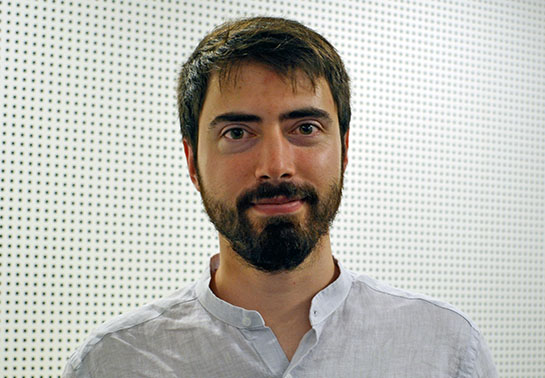A thesis at the IFIC, Bergmann-Wheeler Prize of the International Society for General Relativity and Gravitation
- Fundació Parc Científic
- April 10th, 2019

Adrián del Río Vega, a researcher who completed his doctoral training at the Institute of Corpuscular Physics (IFIC, Universitat de València-CSIC) and the Department of Theoretical Physics of the UV, has been awarded the Bergmann-Wheeler Prize, awarded every three years by the International Society of General Relativity and Gravitation to the best doctoral thesis in gravity and quantum theory. The work, co-directed by José Navarro Salas (IFIC) and Iván Agulló Ródenas (Louisiana State University, USA), proposes that light is polarised in intense gravitational fields, something that challenges classical Physics.
Specifically, the thesis proposes that, from the point of view of quantum physics, the polarization of light changes when it passes through intense gravity environments such as the collision of two black holes that produce gravitational waves. The prize is considered the most prestigious worldwide for doctoral theses in the area of gravitation.
The jury recognizes an "unusual depth" in Adrián del Río Vega's thesis, which "provides a new understanding of the behaviour of quantum fields in curved space-times. Entitled "Quantum Aspects Originated by Gravitation: From Cosmology to Astrophysics", the thesis, published in 2018, focuses on the study of quantum aspects of radiation and matter in scenarios where gravity is intense. Quantum physics studies matter at very small scales, where very different effects occur to those described by classical physics, which describes the world we see.
The most outstanding result is the discovery of a new quantum phenomenon: the dual electromagnetic anomaly. From the classical point of view, light is electromagnetic radiation whose dynamics are not altered by certain transformations of the electric and magnetic field. This symmetry, known as the "electric-magnetic duality", is valid in the world of classical physics, but stops working in the world of quantum physics. "Light from a quantum point of view is formed by particles called photons. If we apply a gravitational field, the classical electric-magnetic symmetry breaks", says Adrián del Río.
This phenomenon, which he calls in his thesis "anomaly of electromagnetic duality", was unknown until now and has consequences that can be observed. "According to classical symmetry, the polarization of the radiation [the direction of the oscillation of the electromagnetic wave] does not change. However, because of the rupture of symmetry that we find through quantum effects, we now know that gravity would be able to polarize light spontaneously, only when it propagates in a gravitational field," explains the researcher.
Therefore, this new quantum phenomenon could be observed by measuring the polarization of photons arriving from astrophysical scenarios where gravitation is intense, such as that produced by the collision of two black holes. These systems have acquired a special interest lately because they are the main sources of gravitational waves, the 'wrinkles' of space-time predicted by Einstein more than a century ago whose discovery was the Nobel Prize in Physics in 2017.
The Bergmann-Wheeler Prize was established in 2008 in honour of Peter Bergmann (1915-2002), a physicist who worked with Albert Einstein, and John Wheeler (1911-2008), who named the black holes. Since then only three theses have been awarded, with Adrián del Río being the first Spaniard to receive the award. The prize will be awarded during a ceremony at the 22nd edition of the International Conference on General Relativity and Gravitation (GR22). This conference, organized every 3 years, is the most important world event in gravitational physics, and is held for the first time in Spain in the city of València from 7 to 12 July, coinciding with the 13th edition of the Edoardo Amaldi Conference on Gravitational Waves.
Adrián del Río Vega (València, 1990) graduated in Physics from the Universitat de València in 2012, later completing the Masters in Advanced Physics at UV. Here he began interactuating with the physics of gravitation and quantum theory, cosmology and black holes from the hand of Professor José Navarro Salas, professor of theoretical physics of UV, with whom he developed his Master's thesis and, later, his doctoral thesis. During his doctorate he carried out several research stays in prestigious centres such as Louisiana State University (2015), the University of Geneva (2016) and the Pennsylvania Institute for Gravitation and the Cosmos (2017).
In 2017, together with his thesis directors José Navarro Salas and Iván Agulló, he obtained the first prize from the Gravity Research Foundation for an essay in which they developed one of the elements of their thesis, on the influence of gravity in the polarization of light by quantum effects. The thesis, defended in 2018, obtained the maximum grade from the court, Cum Laude with international mention. He then obtained a postdoctoral contract from the European Research Council (ERC) to work at the prestigious Centre for Astrophysics and Gravitation in Lisbon, where he is currently carrying out his research in the field of gravitational waves.
File in: Astronomía y Astrofísica , Física
















